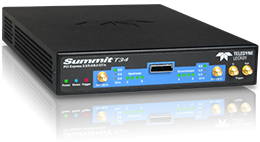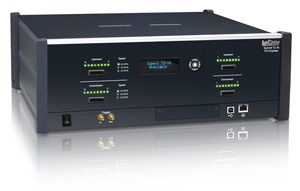Teledyne LeCroy Announcing NVMe Analysis Features for Storage Development and Test
Records and examines data traffic on serial data communication links between devices and systems
This is a Press Release edited by StorageNewsletter.com on June 12, 2015 at 2:13 pmTeledyne LeCroy, Inc. has released PCIe Protocol Suite 7.34 which adds extensive enhancements for PCIe-based storage analysis on the Summit PCIe Protocol Analyzer product line.
Summit T34 Series protocol analyzer
The company is supplier of protocol analyzers and exercisers to companies developing PCIe-based SSD and similar storage products using the new NVMe and SATA Express high-speed serial data standards.
Protocol analyzers and exercisers are used by developers and validation engineers to directly record and examine data traffic on serial data communication links between devices and systems. This equipment enables SSD developers to reduce debug and test schedules, lower engineering development costs on new products and meet aggressive time-to-market requirements.
The company is provider of oscilloscopes, protocol analyzers and related test and measurement solutions that enable companies across a wide range of industries to design and test electronic devices of all types.
As storage developers make the transition from legacy SAS and SATA protocol-based SSDs to the advanced NVMe and SATA Express technologies, they are encountering limitations in available design and test tools including limited trace recording times and a lack of standardized analysis reports for PCIe-based storage.
These two issues are significant for the newer technologies of NVMe and SATA Express due to the following:
-
High performance SSD testing can require recording data traffic beyond a few minutes. This is not possible for many protocol analyzers due to limitations in their recording architectures.
-
While some test tool suppliers have claimed support for the NVMe and SATA Express protocols, support for these protocols has remained minimal. This has hampered developer’s productivity due to the use of reporting systems designed for the older technologies, which are not optimized for quality testing on NVMe and SATA Express products.
Along with the creation of standardized and detailed analysis reports for NVMe and SATA Express, the newly-released Summit T34 protocol analyzer, specifically targeted at PCIe storage applications, supports long trace recordings with a NVMe Enhanced Mode. The Summit T34 can be configured with up to 64GB of trace recording memory. NVMe Enhanced Mode builds on and optimizes the existing deep buffer memory to allow users long recording time capability. Depending on the speed of the DUT (Device Under Test), the recording time can be maximized to up to several hours for a single trace capture. This feature is useful for tasks such as measuring performance or determining how well your Queue handling algorithms are functioning. An example of the metrics that are now available include the ability to measure the NVMe queue distribution over a sustained period of time. The ability to gather queue behavior for long periods helps driver and OS developers fine tune their applications and balance queue loads for optimized product performance.
“Teledyne LeCroy is consistently enhancing the features and functionality in our product lines to ensure that developers have the right tools for test,” said John Wiedemeier, product marketing manager, PCIe protocol analysis, Teledyne LeCroy. “The NVMe Enhanced Mode provides new capabilities for developers, including easier discovery and identification of intermittent errors and the ability to characterize product performance over long periods of time.“
With over a decade of experience in providing PCIe, SAS/SATA and other serial data protocols with standardized error analysis and product performance reports, Teledyne LeCroy has created an NVMe and SATA Express SSD Performance and Analysis capability. Trace Expert, a feature in the PCIe Protocol Suite, creates a detailed report that the SSD industry requires to obtain a common understanding of how their SSD or storage systems are operating and includes information on the necessary PCIe based components. Information such as NVMe queues, commands, doorbell and control registers and many other metrics are captured, analyzed and organized into a detailed report providing developers a comprehensive status document for their products including a wide range of performance statistics. In addition to Trace Expert, the PCIe Protocol Suite 7.34 supports in-depth queue analysis where utilization graphs illustrate how submission and completion queues are operating within a storage environment. Performance issues around queue loading and performance can be easily measured and characterized. New error reports also help developers establish clear and reliable NVMe command traffic between hosts and devices.
Summit T3-16 analyzer
Storage developers interested in conformance testing for PCIe storage are working closely with the University of New Hampshire (UNH) Interoperability Lab (IOL), which is an industry with standardized test suites. The lab uses the IOL INTERACT Teledyne-LeCroy Edition software running on the Summit Z3-16 Exerciser and Summit T3-16 Protocol Analyzer to run the UNH-IOL NVMe Conformance Test Suite. Passing these tests allows a developer’s product to be placed on the NVMe Consortium’s integrators list. The Summit Z3-16 is the Protocol Test Card used by the PCI-SIG for PCIe 3.0 Compliance tests. Teledyne LeCroy was also the first to support CLKREQ# for low power testing of L1 substates on its protocol analyzers and exercisers.
PCIe Protocol Suite 7.34 is available in mid-June.















 Subscribe to our free daily newsletter
Subscribe to our free daily newsletter

